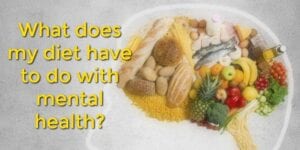
You are what you eat.”
At least that is the popular saying. But is the saying true? Many studies have found that certain foods can and do affect your overall mood. Food is fuel, and the kinds of foods and drinks you consume determine the types of nutrients in your system and impact how well your mind and body are able to function. The two are complexly intertwined in a way that is far-too-often minimized in discussions of behavior, emotion, and overall health.
The phrase “What’s for dinner?” is now being asked in an unexpected place – your therapist’s office. Many studies now suggest that diet is as important to mental health as it is to physical health. A healthy diet is protective and an unhealthy diet is a risk factor for depression and anxiety. Experts do caution that while diet can be part of a treatment plan, it shouldn’t be considered a substitute for therapy, medication, or other treatments.
3 Ways Diet Impacts Your Mental Health
- It is crucial for brain development. The brain is a hungry organ. When we eat foods that nourish us, the nutrients go to the brain first and the brain then transfers information and signals between various parts of the body.
- It puts the brain into grow mode. Certain nutrients and dietary patterns are linked to changes in a brain protein that helps increase connections between brain cells. A diet rich in nutrients like omega-3s and zinc boosts levels of this substance.
- It fills the gut with healthy bacteria. Healthy bacteria is good for the brain. Trillions of good bacteria live in the gut which fend off bad germs and keep your immune system in check, which means they help tame inflammation in the body.
We know that a diet high in unhealthy fat or sugar is bad for your physical health and, therefore, your brain. Certain foods may play a role in worsening or bettering symptoms in mental disorders. A nutritious brain diet follows the same logic as a heart healthy regimen or weight control plan. You want to limit sugary and high-fat processed foods, and opt for plant foods like fresh fruits, veggies, and whole grains. Swap butter for healthy fats like olive oil, too. Some diets to try are the Mediterranean or Paleo diets. These diets swap unhealthy food with anti-inflammatory foods which helps the body and brain function better.
The key is to choose foods that pack as many nutrients in as few calories as possible. Some nutrients that might be particularly helpful for treating or preventing mental illness are:
- B vitamins. People with low B12 levels have more brain inflammation and higher rates of depression and dementia. Falling short on folate has long been linked to low moods. Try fish, eggs, nuts, dairy, asparagus, spinach, and sweet potatoes.
- Iron. Too little iron in the blood (iron-deficiency anemia) has been linked to depression. Try fish, lean meat, broccoli, and spinach.
- Omega-3s. These healthy fatty acids improve thinking, memory, and mood. Try fish, dairy, flaxseed, Brussel sprouts, kale, and spinach.
- This nutrient helps control the body’s response to stress. Low levels can cause depression. Try oysters, shrimp, spinach, kidney beans, flax seeds, and garlic.
- Fermented foods with live active cultures, which provide healthy gut bacteria, may help reduce anxiety, stress, and depression. . Try low sugar yogurt, kefir, kombucha, fresh sauerkraut, and pickles.
- Antioxidants increase blood flow to the brain, aiding mood and memory. Try dark chocolate, grapes, blueberries, nuts, and green veggies.
- Vitamin D helps boost mood and though is found in milk, the main source is to go outside and soak up the sun. Don’t forget the sunscreen though!
- Water. Even mild dehydration can influence mood, energy levels, and the ability to think clearly. Regrettably, we often use thirst as an indicator for when we need to drink but experts say that that response is already too late. Our thirst sensation doesn’t really appear until we are already dehydrated which starts to impact how our mind and body perform.
For Anxiety and Stress
The foods that you put in your body can not only worsen your anxiety and stress levels, but it can also dramatically improve your mood and overall health when choosing the right foods.
- Oatmeal– Oats increase the production of the calm inducing serotonin in the brain. Oatmeal is also comforting, filling, and will not spike your blood sugar the way refined carbohydrates and sugars do.
- Blueberries– Blueberries have an extremely high level of antioxidants and also contain vitamin C which both work well to protect and repair cells when we are stressed or anxious.
- Avocados – Avocados contain B vitamins which provide healthy nerves and brain cells. Avocados can be eaten alone or added to just about anything such as smoothies, salads, or toast.
- Dark Chocolate– Some studies have shown that dark chocolate can help you feel calmer by stimulating serotonin in your brain.
- Oranges– The vitamin C in oranges and other citrus fruits help lowers blood pressure and reduces the stress hormone cortisol. Have some fresh squeeze orange juice or oranges slices for a snack throughout the day.
- Asparagus – Asparagus is high in the B vitamin, folic acid and also contains potassium, vitamin A, and Vitamin K. Low levels of folic acid have been shown to cause neurotransmitter impairment.
- Leafy Greens– Spinach, kale, and many more leafy greens should become staples in your diet if you struggle with stress and anxiety. The high levels of magnesium contained in leafy greens will help to regulate cortisol levels.
- Almonds – Almonds contain Vitamin B2 and E which can assist the immune system in times of great stress. They are also comforting and the perfect stress relieving snack to crunch on at times of need.
- Chia and Flax seeds– Chia and flax seeds contain Omega-3 Fats which has been linked to protecting and promoting overall brain health. Add these to your salads and smoothies every day.
For Depression
When you are depressed, the last thing you may feel like doing is reaching for a stalk of broccoli. We want rich, creamy, stick-to-your-ribs foods that’ll make us feel like we’re wrapped in a soft cuddly blanket. The problem is that most of those foods bring with them a host of negative health issues. Instead, opt for healthier options.
- Turmeric– antioxidants present in turmeric have been shown to have anti-inflammatory effects, making it beneficial for cardiovascular system and it has been shown to reduce depression. You can add turmeric to your diet simply by adding it to your smoothies, oatmeal or having some delicious turmeric milk at night.
- Salmon – In several studies, Omega-3’s were shown to be helpful in reducing depression symptoms in adults and children. The easiest way to do so is to eat oily fish like salmon, mackerel, trout or sardines.
- Dark Leafy Greens – These foods fight against all kinds of inflammation because they contain oodles of vitamins A, C, E, and K, minerals and phytochemicals which can lift your mood.
- Avocado – Avocados are power foods because they contain healthy fat that your brain needs in order to run smoothly They also contains 4 grams of protein, higher than other fruits, and is filled with vitamin K, different kinds of vitamin Bvitamin C, and vitamin E-12. Also, they are high in fiber.
- Blueberries– Blueberries have an extremely high level of antioxidants and also contain vitamin C which both work well to protect and repair cells when we are feeling depressed.
- Coffee – Though we don’t recommend a ton of caffeine, a small bit can give you a lift in your mood. Just remember to go easy on the fillers such as creamer and sugars. Also, this can increase anxiety in some people so avoid caffeine if it triggers more stress.
Basically, the optimal diet for people who struggle with depression is full of colorful fruits and veggies, lean meats and fish, water, and exercise.

Sources
